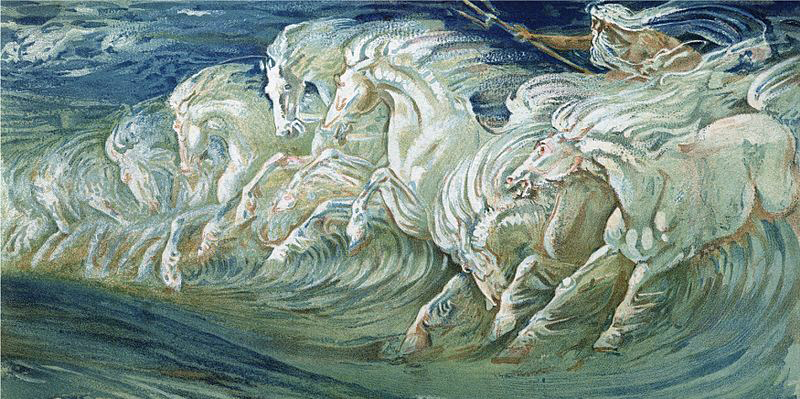Long he slept. Centuries and millennia of years he slumbered.
The age of creation had demanded hard labor, and he had given freely of himself, cooling the lands made molten by his sister Gaia, collecting the rains of his brother Ouranos, and wielding the gathered waters to shape plains and shores, valleys and deep, deep ravines.
At the end of his work he retreated, claiming a lesser portion of himself.
Let his sister’s son Poseidaon rule the oceans and the seas. Let his half-brothers—a multitude of them—dwell within other streams, other rivers, guarding their clarity and guiding the speed of their flow. He would reserve for himself just this one important ribbon of earth’s tears. Its headwaters sprang from the river traversing the underground realm of his brother Plutonos. Bursting through a cleft in the rock of a high place, the spray fell free, down and down—its drops a crystalline thread in the air until they crashed into the cauldron below, a raging vessel of froth and fury. From there they leapt merrily over boulders and down slopes, a young river at the bottom of a ravine, broadening as it ran, calming, until—where the cliffs sank to form a rich vale—the waters proceeded serenely, limpid and green in the sunlight, grey and opaque under cloud, but always lifegiving, despite their source in the underworld.
This was the river Morvarag—Blackbourn—black for its peaty soil in the valley, black for the dark cliffs along its upper reaches, black for its dark birth among the dead.
Morvarag was its name, and Morvarag became his name, too, as he slept. For in his slumber, he dreamed. And as he dreamed, the people on his banks—his people—dreamed his dreams with him.
They dreamed of the labor he had done, mirages of molten earth shining in crescents and seas of shimmering heat, visions of spraying lava and hell-lit skies. They savored reveries of present fecundity—schools of gleaming fish, rich tillage, violet-scented glades, summer breezes, feasts of roasted meats and sweet mead at the end of the day. They embarked upon trances of future glory, starlight and a long, long journey into mystery.
The people dreamed his dreams by night and named him guardian of the night watches, mediator between them and the powers of darkness. But by day they were busy. They made tools of knapped flint, they hunted deer and aurochs, they built huts of reeds and river mud. Their children splashed in the shallows, while mothers washed stone vessels and hunters speared great river sturgeon in wild boat hunts.
Their toolmakers learned to cast bronze. Their kitchen gardens expanded to become fields of grain. They prospered.
All the while, their god dreamed, keeping them safe through the night.
Their days grew less safe, not because of their neighbors, the tribes who fished and traded along the great flood of the river Danouvios, into which the Morvarag flowed. No, it was a more distant people who posed the threat.
The foreigners were men of pride and spirit, with a desire to possess and rule all the lands to the horizon. With each valley they took, the farther their horizons stretched. On and on they marched, helmets bright under the sun, their lorica segmentata clanking—armor stronger than a gorgon’s bones—and each gladius thirsty for blood.
They torched villages, put women and children to the sword, and defeated the warriors whose fishing spears were nothing to the invaders’ heavy pilums, whose bronze blades were battered ragged against the iron of the invading legions.
The river dwellers cried out to their god, begging that he extend his nighttide protection into day, praying that he rise and confront the trespassers, demanding that he take vengeance for their slain.
But Morvarag slumbered on.
The invaders built a bridge to carry their legions across the river to the richest fields and the most prosperous villages.
Wicker crates shaped like pyramids and filled with stones were lowered into the waters to kiss the riverbed and sink deep.
Morvarag felt them in his sleep—like bruises against his shins.
The crates of stones anchored barges, a whole series of them, floating at careful intervals from bank to bank.
Morvarag felt these, too, each an oppression upon his skin.
From barge to barge, the invaders laid a wooden roadway, its timbers stout to bear the tread of marching men. And Morvarag felt the weight of the dead trees as a suffocation, a thickness to smother fire and dreams. He stirred, but still he did not wake.
The soldiers began to cross, their sandaled feet heavy on the span, their voices loud in answer to their herald’s cry—are you ready?
“We are ready!”—a thundered reply.
“We are ready!”—louder still.
“We are ready!”—to break mountains.
Morvarag woke.
The bridge bound him. As an iron band tormenting his ankles, it bound him. As an abrading rope around his knees, it bound him. As manacles on his wrists, it bound him. As braided linen at his elbows, it bound him. A hangman’s noose about his neck, it bound him.
He was bound, but not powerless.
“My brother! Loose your might!” he roared.
He might have done it himself. He’d shaped rock with his waters, cooled fire, flooded seas. The cracking open of a cleft in a cliff must have been nothing, even bound as he lay. But he would be courteous of the rights of others; the underground river was not his.
“Plutonos! To me!”
And the lord of the dead answered, not with breath and voice, but with the thunder of rock shattering. The cliff burst open and the water of the dead king’s river spewed as a maelstrom of jagged wavecrests pocked with rubble, raging down the ravine, scouring the clifftops, a churning fury of destruction against which no legion could stand.
The floating bridge transformed to splinters in an instant, and the soldiers?—on the bank waiting to cross, arrived on the far side and debarking, or marching the fraught span itself?—pulped dead men carried downstream for the river dwellers to witness, and be grateful.
For more flash fiction, see:
Blood Falchion (The Old Armory, Part I)



